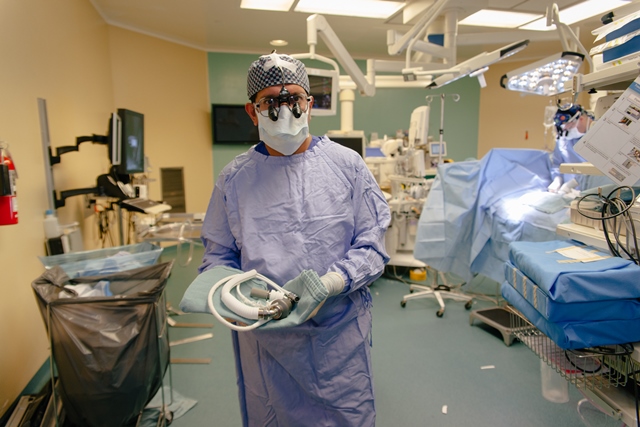
By Stefan Superina
Every moment of your life is a second chance. Just ask Marcel Powell.
The last thing the 27-year-old musician remembers before fainting in the waiting room of the Hamilton General Hospital in May of 2015 is being with his goddaughter and his fiancée, Maria. He awoke five days later in a hospital bed at the Peter Munk Cardiac Centre (PMCC) with a mechanical pump secured to his heart.
“Marcel came to us in a severely compromised state,” recalls Dr. Vivek Rao, Division Head, Cardiovascular Surgery at the PMCC. “He was put on immediate life support to maintain blood flow and oxygenation to his body’s vital organs.
“He had several blockages in his coronary arteries, which was unusual for a man of his age. There were some prior risk factors that led to this. As a result, Marcel underwent bypass surgery and subsequently needed a mechanical cardiac assist device to maintain his heart function.”
Implant of mechanical heart
On May 28, 2015, cardiovascular surgeon Dr. William Stansfield and a multidisciplinary team performed a delicate operation to implant the mechanical heart on Marcel’s left ventricle, the lower chamber of the heart that receives blood from the left atrium and pumps it out under high pressure through the aorta to the body.
The device uses a tiny, continuously-moving propeller to help blood flow. The mechanical heart would support Marcel’s damaged heart until its function recovered or until a matching donor heart could be found.
Like any major medical event, having a mechanical heart implanted and adjusting to life with it was stressful and emotionally difficult for Marcel. The idea of having to learn about a new technology right after heart surgery was at times overwhelming.
“I realized I had to make some drastic lifestyle alterations to adjust to life with the pump and adopt a healthier lifestyle,” says Marcel. “One thing that really kept me going was my artwork.
“Writing music instilled in me the positive belief that things were going to take a turn for the better.”
When one considers the sobering statistics about heart failure in Canada, Marcel’s chances of finding a new heart were dim.
Every year in Canada, more than 50,000 people are diagnosed with heart failure. Of those, 2,000 have advanced heart failure. There are approximately 200 heart transplants performed a year in Canada, leaving about 1,800 people across the country still in need of a heart transplant or who could benefit from a mechanical cardiac assist device.

Luckily for Marcel, over the course of the next year something truly remarkable started to take place with his heart – it slowly started to regain its function with support of the device. Indeed, this was a very rare occurrence. There had only been one successful explant of a mechanical heart in the program’s history.
“Most of the time when we see native recovery after a mechanical heart implant, it is after a short term,” says Dr. Rao. “We take the patient in, treat them and a week later they are on their way.
“In Marcel’s case, we started to notice recovery over a prolonged period of time (several months) to the point that we put him on hold on the transplant list. At his age, it would be much better to have the pump taken out.”
A year and four months later, on Sept. 28, 2016, Marcel returned to PMCC to have his mechanical heart removed. It was a complex procedure whereby doctors had to work around a significant amount of scar tissue to partially remove the device.
“We essentially turned the pump off and cut off one part of the device so that there was nothing leading into Marcel’s heart anymore,” says Dr. Rao. “For Marcel, it’s important that he still recognizes that he has a heart problem, has had heart issues in the past, and is still at risk for developing heart issues in the future. He needs to be seen very closely by the PMCC cardiologists to prevent reoccurrence.”
Collaborative expertise
The team effort to save Marcel’s life cannot be overstated. The belief that patients are best served in a team-based approach at the PMCC allows for different perspectives, taking the skills of multiple healthcare professionals and using them on patients with complex problems such as Marcel.
“Cardiologist Dr. Phyllis Billia and nurse practitioners Marnie Rodger and Jane MacIver were nothing short of amazing,” says Maria, now Marcel’s wife. “They helped keep Marcel alive, and you can be sure that he will repay that debt by taking better care of his heart.”
The Mechanical Heart Program is one of only a few programs in the country that can offer patients like Marcel this life-saving treatment. In fact, it is not uncommon to find transplant cardiologists in other centres across Canada who trained at the PMCC.
“We’re hoping to show in the long-term that there will be a cost-saving to the entire healthcare system because these devices reduce re-hospitalization,” says Dr. Rao. “Because of limited funding in Canada, we’re only doing approximately one per cent of potential patients that are eligible for a mechanical heart.”
Philanthropic impact
Donors play a vital role in funding these devices. In so doing, they allow the PMCC to provide proof-of-concept to the Ontario Ministry of Health and Long-Term Care to further fund innovative healthcare technology of this kind.
It’s an invaluable model very much indicative of what future funding for healthcare technology will look like.
Despite all that we can do to encourage the public to register to become a donor, donations for heart organs have not increased. The mechanical heart is a wonderful answer to that problem.
And philanthropy is the key to its success.
“I was given a second chance at life,” says Marcel. “Not a lot of people on the transplant list get off.
“I was extremely fortunate. I’m only 27. I still have my entire life in front of me. And the only reason I’m alive today is because of the team at the Peter Munk Cardiac Centre.”
Stefan Superina is a Communications Specialist, Toronto General Western Hospital Foundation.

